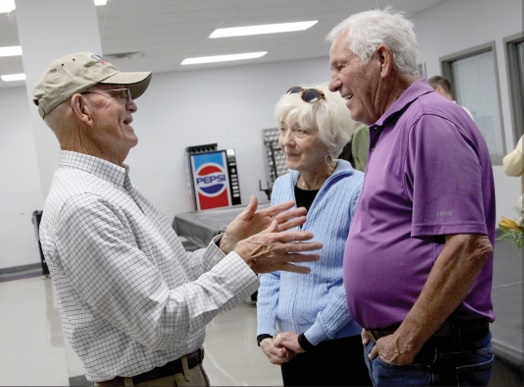Officials address Citizens for Justice
Citizens For Justice — Barry County held its second community meeting on Nov. 4, largely focused on county and state officials in attendance addressing the group’s concerns.
The group initially met on Sept. 14, organized by resident Donnie Stumpff on 24 hours notice after hearing how many people wanted to be involved. About 100 people attended that meeting, organized to address local crime trends, specifically ongoing burglaries, and starting a community watch program.
No county officials were able to attend that meeting due to scheduling conflicts.
On Nov. 4, three county officials, a state representative and a stand-in for a state senator were in attendance and three addressed the crowd of about 75.
Stumpff started the meeting by recognizing the officials in attendance, including Sheriff Danny Boyd, Presiding Commissioner Steve Blankenship, Northern Commissioner Gary Schad, State Rep. Scott Cupps, R-Shell Knob, and the representative for State Sen. Mike Moon, R-Ash Grove.
Stumpff said he had met with Barry County Prosecutor Amy Boxx, who said she would attend if her schedule allowed, and it did not. Stumpff also said Southern Commissioner Gene Robbins had informed him of a conflict and could not attend.
After recognizing officials in attendance, Stumpff delivered an anecdote aimed at showing the possibilities of the neighborhood watch program. He said recently, a woman who had been at the meeting called to inform him there was a “naked man” on the Stumpff Family Event Center property crawling on the ground.
“I called [Cassville Police Department Interim Chief] Donnie Privett and said Donnie, if you would, please go check that out,” Stumpff said. “He was down there in a matter of seconds, and when he called me back he said, ‘What have you gotten me into? That guy was nine kinds of drunk and having a psychotic break.’ I would have not known that, and it’s a prime example of how a community watch program can work if it’s ran the right way.”
Stumpff said according to the FBI, areas with a community watch program are 43 percent less likely to be a target of criminal activity. He said it has to be an organized program where those with concerns call one person to pass information along to the authorities.
Stumpff also reiterated the community watch program is not intended to be a vigilante organization.
Brian Stehlik addressed the crowd next, discussing the 1/2-cent law enforcement sales tax passed in 2022. To further explain how the tax works and its uses, Stehlik brought Schad to the front.
Schad said though the tax was passed in April 2022, collection did not begin until October 2022, only three months before the 2023 budget is adopted. Schad said because officials cannot budget money they do not have, the approximately $2.7 million collected over last year and this year will first be budgeted in January 2024.
“We have to pass a budget with the amount of money we have,” he said. “You see the sales tax come in, but we couldn’t budget that because we didn’t have it yet. What we did this year was budget what we had. This next coming year, it’s going to be a little bit different. As of right now, we have $2,300,420 in our law enforcement tax that goes directly to the sheriff, prosecutor or jail.”
Schad said budgeting is finalized in January, typically by the third week. Officials submit their budgets to the commission for consideration, then Blankenship, Schad and Robbins determine the full county budget.
Schad said because of the boost in the budget to the sheriff’s office with the Law Enforcement Sales Tax, general fund revenue was freed up to build the new jail, which the county intends to pay off in seven years.
“Once that happens, a lot of that money is going to go back to the sheriff’s department,” he said. “The prosecutor’s office, sheriff’s department and jail are the three biggest expenses we have, and once we get the jail paid off, we’re going to try and keep pushing money toward them.
“Government’s slow. I found that out real quick when I got in office. I thought I was going to change the world. It doesn’t happen very fast. It’s been six years I’ve been trying to get us a new jail and now we’re finally getting one built.”
Schad said the commission approved $1.7 million for the sheriff’s office, prosecutor and jail. He said in 2024, that number will almost double.
Schad also said the county is financially sound and does all it can to help law enforcement, and hiring is a challenge.
Boyd then took over the lead, saying the office is hoping to hire more deputies, but the Missouri is 1,000 officers down state-wide. Boyd said their problems hiring is getting applicants, so much so that Boyd is working to pay for a prospective deputy’s academy training, at a cost of about $8,000, if they commit to work in Barry County for three years, and if they leave early, could be forced to pay back some of the academy costs.
Boyd also said with only two cars on the road, deputies are getting burned out, a complaint frequently expressed in exit interviews.
As for the community, Boyd said he supports the idea of neighborhood watches.
“I think it’s great and I hope we get it throughout the whole county,” he said. “When people know you’re watching them, they are going to quit doing that crap.”
Boyd also said the problems with repeat offenders being released, a concern voiced multiple times in the Sept. 14 meeting, is at the state level.
“They have failed us,” he said. “And guess who gets the punishment — small town America. I talked to a sheriff over in St. Louis, and you could not pay me a million bucks to have that job. They have 14-year-old kids walking the street with ARs and they can’t do anything about it.”
Stumpff asked Boyd who specifically decides to release repeat offenders. Boyd said inmates can be held for a length of time, and the prosecutor does not want to kick people out, but because of the state of the jail and recent escapes, Barry County has not been able to hold as many inmates as before.
Boyd said the locks to fix doors in the jail cost $4,000 each, and the county needs eight to repair the current jail. The county now pays for some inmates to be housed in other county jails.
An attendee later asked Boyd how many officers he thinks the new budget could add.
“At least eight,” Boyd said. “I have to see money-wise where we’re at. That is going to play a big part, because you can have all the officers you want, but if you don’t have the tools and equipment to make sure they can do the job properly.
“It costs $100,000 by the time you dress them in a proper uniform, get them trained and in a vehicle.”
Boyd continued to say his goal was to have 10 more officers, but he needs qualified applicants.
As the meeting progressed with questions from the crowd about budgeting and holding inmates, Stumpff mentioned his conversation with Boxx in regards to repeat offenders.
“I asked her if there was a state law prohibiting her from holding these people. She said she has to answer to the Supreme Court, and unless it’s a violent crime, she has to release them, or if they are a flight risk. If it’s a repeat offender, we need to find some way to hold them.”
Another attendee asked Boyd the best way to protect her property given the sheriff’s office is shorthanded. Boyd referred her to Missouri’s Castle Doctrine, which allows individuals to defend their homes and property with deadly force, but only in the case of reasonable belief the perpetrator is committing a felony involving the use of physical force or violence, or when force is used to unlawfully enter a home, vehicle or private property.
Boyd also cautioned against use of force in defending from thieves.
“They say that property can be replaced and a person’s life cannot,” he said. “What I ask people is, do you want to go to court and put yourself in the hands of 12 jurors because you shot a guy because he stole something out of your house? If you feel threatened for your life, you do what you got to do. But if someone comes onto your property to steal your lawn mower and you shoot them, I’ll tell you right now if you go to court on that with a jury, you’re not going to win.”
Boyd advised if a Castle Doctrine situation does occur, the property owner should tell the responding deputy they were in fear for their life.
“But remember, you still have to go to court and explain why you did what you did,” he said.
After a couple more questions about what can be done to stem crime, Cupps took over the front of the room and thanked Stumpff for his work in organizing the Citizens for Justice group.
“He genuinely wants us to work together to find a solution,” he said.
Cupps said when it comes to the state level, authority over criminals is largely on the judicial side, and the Missouri Department of Corrections is struggling to retain officers.
“Amy answers to two sets of people, the people who elect her, and the Supreme Court,” he said. “She has the authority to prosecute the laws our legislature makes. Our Department of Correction is a trainwreck for one reason and one reason only. We can’t hire anyone. We are paying some correctional facilities officers a couple hundred thousand dollars a year — more than the governor makes.”
Cupps then asked the crowd by a show of hands who thought theft was the problem and who thought the theft is a byproduct of the drug issue. The majority of the room raised their hands for the latter.
“This is not 1910 and people stealing stuff because they want it — they are stealing it because they need to sell it in order to get the money to feed some kind of addiction. We have a drug epidemic that has turned into a theft epidemic, and for us to enforce the theft epidemic without doing something about the drug epidemic does not accomplish anything.”
Cupps went on to address the push for criminal justice reform, saying the lock-them-up-and-throw-away-the-key approach is popular locally but is not an opinion the majority share statewide.
“They always go back to tell you we cannot be locking people up for nonviolent crimes because they are not getting reformed,” he said. “A majority of the populace does not want to lock them up and throw away the key. They want to understand the real problem and drug epidemic. They could lock someone up and it may keep them from stealing something that night, but the day they get out there’s a high probability they will go out and steal something.”
Cupps also said what residents may not realize is when it comes to crime, Barry County is not among the most dire areas of the state.
“We actually are above the curve in Barry County — substantially above the curve,” he said. “We are a lot better off here than pretty much anywhere else in the state. If you come here and talk to someone who’s just had their trailer stolen, they’re not going to get that, but the reality is that is true. And, that’s not just in the state of Missouri — it’s nationally.”
Cupps went on to discuss an advanced electronic monitoring program to help keep criminals more accountable when released from jail.
He also addressed the police officer shortage, especially at the Highway Patrol. And, even though the climate for police is not as negative in the Cassville area as other parts of the country, there still are not many wanting to enter the law enforcement field.
Cupps continued that most people follow their parents’ career paths, such as himself as a farmer and Stumpff’s son as an auctioneer. He said the No. 1 reasons people do not follow their parents’ field is due to an educational program in high school, especially with agriculture classes producing first-generation farmers, JROTC producing first-generation military and band programs producing professional musicians.
“We have no programs that are set up encouraging folks to go into law enforcement — none,” he said. “We have ROTC and vocational programs but nothing for law enforcement. We need to look at a local level what resources we could use to start a program to get young people involved. If they have the opportunity stay here and make really good money working at the local sheriff’s office, that’s something there’s a lot of power to, and that’s something we could incentivize at the state level.”
Cupps said state-level officials have realized they need to think outside the box because what is being done is not working.
“We, as a group that wants to make a difference, think outside the box and do something for the future, and that’s why I’m throwing those ideas out here tonight,” he said. “We can’t keep doing the same thing and expect different results; we all know what that’s the definition of.”
Stumpff ended the meeting by asking people to join the Citizens For Justice — Barry County Facebook group to help solve crime issues going forward. He also asked for those interested in joining a neighborhood watch program to get with him to make it happen.
“I’m going to do my best to work with Danny and the commission on this and do what we can to make this better,” he said.
Stumpff said he is planning to host another Citizens For Justice — Barry County meeting about a month after the last one, with the focus primarily on the neighborhood watch.
“We’re going to gather a bit more info and see how far we can get with the community watch,” he said. “I have a few guys who are up to being the main person in their area, so people would call them and they would call me or the sheriff’s office. I’ve asked people who live in Eagle Rock, Golden, Mano and Shell Knob who can be that main guy, so hopefully we get those put in place next meeting and can start sharing contact information.”
Stumpff said there has also be some discussion of signage, and the goal of working with Boyd.
“We’ve discussed signs among a few of us and are trying to find out the best way to do that,” he said. “We want to work in conjunction with the sheriff’s office and do whatever we can to help him.”




